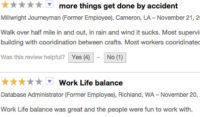Posting on a prominent job-review website, an employee of one of the world’s top engineering and construction- management firms lauded it as a “good company” with “great benefits.” Not so, fumed someone else, claiming to be a fellow employee. “You are a tool for [unnamed company]. They pay handsomely for that tool, but when they don’t need you anymore, they put you away.” The online world can be a particularly brutal one for employers in the construction industry. The explosion of social media, including online feedback to news stories, has opened up multiple venues for former and current embittered employees— as well as angry customers and subcontractors— to vent at the targeted company’s expense.
With mobile devices’ rapid ability to post comments on recruitment and news websites, the proliferation of social-media tools, and the sheer vastness and anonymity of the electronic universe, a new set of challenges has emerged. As with recommendations on hotel websites, a percentage of the comments posted are made anonymously by supporters or rivals of the businesses being reviewed. Media risk experts say the best way to contain any possible damage to a firm’s reputation is to stay abreast of what is posted and, in a constructive tone, promptly reply to the numerous comments that comprise the trend (see box). Once a sufficient number and intensity of negative comments are posted on a recruitment and job-hunting website such as GlassDoor or CareerBliss, the comments may be read by potential new employees and by current employees, wondering if it is time to seek work elsewhere.
That can cut motivation. Mentions made in the postings about sensitive subjects, such as prior litigation or contract terminations, can damage a company’s chances to win new work. “Unfortunately, the dark side of social media can be the crowd-sourced sites that rely on user reviews—of products, services, places to work, etc. They can be amazingly positive but also downright inappropriate at times and definitely can negatively impact a firm’s brand,” says Scott D. Butcher, a vice president of JDB Engineering Inc. and author of “Reputation Design + Build,” published this year. Firms that are caught unprepared for public criticism on social media and websites—with their ever-lengthening comment chains—or have not developed a strategy for courting the traditional media world of newspapers and broadcasting, could put themselves and their employees at risk, says Roland Schatz, CEO of Switzerland-based Media Tenor International.
“In today’s world, you have to be good at manipulating all channels of communication,” says Schatz, a leading mediaimpact researcher whose firm advises companies on how to manage their reputations in both traditional and social media. Many businesses “are just not prepared for it.” Major industry contractors typically attract several hundred or as many as a few thousand reviews. Some are downright outrageous, and others are easily dismissed as sour grapes. A review of a major contractor leaves little to the imagination, contending that “certain staff … and HR people are vengeful, vindictive and racist.” Other comments—for example, a positive review that contains a nasty dig or two—are harder to parse. One “superintendent” praised his company as the “best in the Northwest,” only to follow that with a warning that effectively skewers the company’s entire management structure. “Senior engineers will throw you under the bus,” the superintendent says, adding that the company is packed with “middle management suckups.” Going Viral Schatz and other experts say companies need to worry about more than just the threat of a negative story going viral and tarnishing—in a matter of minutes—a business reputation that has been built painstakingly over years or decades.
Firms also can sustain damage from the steady drip, drip, drip of negative commentary and withering put-downs posted on multiple job-review sites. “Social media, unfortunately, can give rise to fake whistle-blowers,” says Charles Field, a Boston-area public-relations consultant who has worked closely over the years with various construction contractors. “People can make statements that would injure your reputation without any filter.” In addition to posted comments on news websites and social-media sites, companies also have to worry about blogs and their often freewheeling comment sections. Unchecked by accurate or positive portrayals of a company, such comments can have a deleterious impact on a company’s reputation, especially when hiring new talent, Field and other media-risk experts contend. The concern is not just the negative comments themselves but also how they fit into the totality of what a potential job recruit or customer will find in an online search.
To a certain extent, job seekers and others will discount the reviews they read on GlassDoor or other rating sites, knowing some people have axes to grind, Field said. But seeing online a mass of negative commentary about a company on jobreview sites and other venues can overwhelm any positive news or announcements and present a skewed image that can be damaging, he added. While some construction companies have developed their media presence, others have yet to invest in social media, seeing it as another cost that counts against the bottom line. “You take an industry where cost and profit have always been measured by time and material and, to most construction companies, a communications budget is a cost center, not a profit center,” says Andrew Paven, a senior vice president of O’Neill and Associates, Boston, who served as spokesman for Bechtel during construction of the city’s multibillion-dollar and often controversial Central Artery/Tunnel project. But with image key in the construction sector, companies not only need to track who is mentioning them and why, but also take proactive steps to counter misinformation. “Brand and reputation are huge and tangible assets,” says Mark Beasley, director of the Enterprise Risk Management Initiative at North Carolina State University.
“Being more proactive will increase the odds of being better prepared for a reputation event.” Media expert Schatz, who co-authored a 2007 Harvard Business Review article called “Reputation and Its Risks,” argues that industry firms without good media crisis management plans can be left with limited options should a negative story go viral or trigger a media feeding frenzy. “They don’t think ‘I need to build a shelter in order to defend myself in those times when I am facing attack,’ ” he says. Kevin Kahn, a former design firm human resources director who left the industry after an acquisition and now runs the same function in a consumer products company, says that “while it’s not possible to prevent negative postings on sites such as Glassdoor and Hallway, if a candidate asks about a negative social media posting, we address it.” The firm also is boosting employee-friendly policies to counter potential negative buzz and actually discovered, through a critical post, that a hiring manager had been asking inappropriate questions during interviews. “We won’t go down the path of some organizations and create positive postings,” he says. “A positive posting with a message in a sea of negative comments is more damaging … in my opinion.”
SIDEBAR
HOW TO GUARD YOUR COMPANY’S ONLINE REPUTATION
• Monitor mentions in media and social media. Watch for trends in comments rather than responding to bad ones that pop up occasionally.
• If people are complaining about something consistently but you don’t believe the complaints accurately reflect the company, create new content that contradicts them. Post on YouTube, Facebook, LinkedIn, Twitter, and any other site you use.
• If you can’t counteract the negative comments with genuine examples or points, you have to determine if there is truth to the comments.
SOURCE: REPUTATION DESIGN + BUILD BY SCOTT BUTCHER






